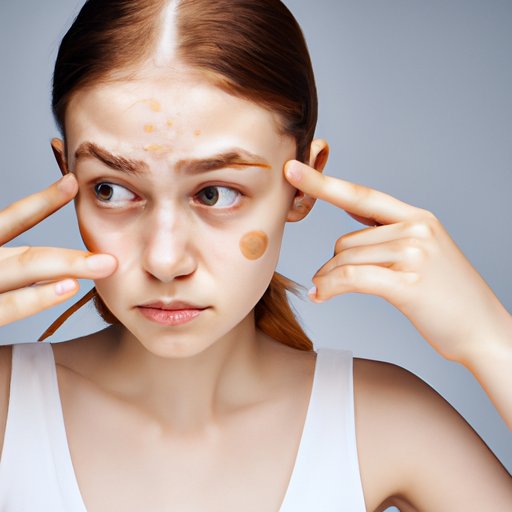Introduction
When it comes to skin care, there are many misconceptions out there. One of the most common is the belief that moisturizer can cause acne. But is this really true? To answer this question, it’s important to understand what acne is and how moisturizers work.
Definition of Acne
Acne is a skin condition that is caused by clogged pores. It can appear as blackheads, whiteheads, pimples, or cysts. Acne is usually caused by an excess of oil and dead skin cells in the pores, which can be exacerbated by hormones and certain medications. Acne can affect anyone at any age, but is most common during adolescence.
Overview of Moisturizers
Moisturizers are skincare products designed to keep your skin hydrated and protected. They work by forming a protective barrier on the surface of the skin, trapping moisture and preventing water loss. Moisturizers also contain ingredients such as humectants, emollients, and occlusives which help to soothe, soften, and nourish the skin.
Examining the Relationship Between Moisturizers and Acne
Is Moisturizing Causing Your Breakouts?
When it comes to moisturizers and acne, there is no clear-cut answer. Some people find that their breakouts are exacerbated by moisturizer, while others find that their skin is left feeling dry and tight if they don’t use one. Ultimately, it comes down to individual preferences and skin type.
What You Need to Know About Moisturizer and Acne
The truth is, moisturizers are not necessarily bad for acne-prone skin. In fact, moisturizers can actually be beneficial for those with acne. The key is to choose the right kind of moisturizer for your skin type and to use it properly. Heavy, oil-based moisturizers can clog pores and make acne worse, while lighter, water-based formulas are less likely to cause breakouts.
The Pros and Cons of Using Moisturizer for Acne-Prone Skin
Benefits
Moisturizers can be beneficial for those with acne-prone skin because they can help to reduce inflammation and redness associated with breakouts. They can also help to keep the skin hydrated, which can help to prevent future breakouts. Finally, some moisturizers contain acne-fighting ingredients like salicylic acid, which can help to reduce existing blemishes.
Limitations
On the other hand, heavy, oil-based moisturizers can clog pores and make acne worse. Additionally, some moisturizers contain fragrances and other irritating ingredients that can further irritate acne-prone skin. It’s important to read labels carefully and to avoid any ingredients that may irritate your skin.
How to Choose the Right Moisturizer for Acne-Prone Skin
Understanding Your Skin Type
The first step in choosing the right moisturizer for acne-prone skin is to understand your skin type. Oily skin tends to be more prone to breakouts, so it’s best to avoid heavy, oil-based moisturizers. Dry skin, on the other hand, needs more moisture and can benefit from heavier formulas. Combination skin usually requires a combination of both.
Looking for Key Ingredients
When shopping for a moisturizer for acne-prone skin, look for formulas that are labeled “non-comedogenic” or “oil-free.” These types of moisturizers won’t clog pores and will help to keep your skin hydrated without causing breakouts. Additionally, look for moisturizers that contain anti-inflammatory ingredients like aloe vera, green tea extract, and chamomile to soothe redness and irritation.
Choosing the Right Formulation
Finally, consider the type of moisturizer you need. Creams, lotions, and gels are all good options for acne-prone skin, but light, water-based formulations are generally better. Avoid heavy, oil-based moisturizers, which can worsen breakouts.
Do Moisturizers Cause or Prevent Acne?
Debunking the Myth: Does Moisturizer Really Cause Acne?
Despite popular belief, moisturizers do not cause acne. However, the wrong type of moisturizer can make existing breakouts worse. It’s important to choose the right type of moisturizer for your skin type and to use it properly.
Moisturizers as a Prevention Tool
In addition to helping to reduce existing blemishes, moisturizers can also be used as a prevention tool. Keeping your skin hydrated and healthy can help to prevent future breakouts. Additionally, some moisturizers contain acne-fighting ingredients that can help to reduce inflammation and redness associated with breakouts.
Conclusion
Moisturizers can be beneficial for those with acne-prone skin, but it’s important to choose the right type of moisturizer for your skin type. Heavy, oil-based moisturizers can clog pores and make acne worse, while lighter, water-based formulas are less likely to cause breakouts. Additionally, some moisturizers contain acne-fighting ingredients that can help to reduce inflammation and redness associated with breakouts. By understanding your skin type and looking for key ingredients, you can find the right moisturizer for your acne-prone skin.


